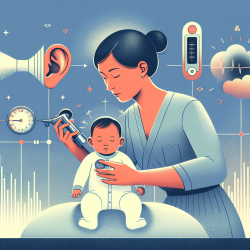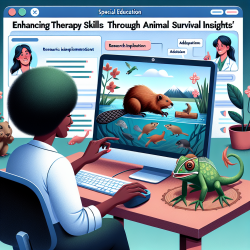Introduction
Newborn Hearing Screening (NHS) is a critical step in identifying hearing impairments early in life, which is essential for the development of communication and learning in children. A recent study titled "Epidemiological Profile of Neonates in Hearing Screening at a Maternity of a Tertiary Hospital in the state of Santa Catarina, Brazil" sheds light on the clinical and epidemiological profiles of neonates and the factors affecting NHS outcomes. This blog aims to help practitioners improve their skills by implementing the research outcomes or encouraging further research.
Key Findings from the Research
The study conducted at a tertiary hospital in Santa Catarina, Brazil, analyzed the NHS results of children born between July 2016 and July 2019. Key findings include:
- 1.9% of neonates did not undergo NHS.
- 18.2% required a retest, with 1.5% remaining with insufficient results.
- Factors such as natural delivery, maternal arterial hypertension, and certain medications were linked to higher failure rates in tests and retests.
- False positives were notably high at 62.8% in the first test, exceeding the ideal goal set by the Joint Committee on Infant Hearing (JCIH).
Improving Newborn Hearing Screening Outcomes
Practitioners can enhance NHS outcomes by focusing on the following areas:
1. Addressing Modifiable Risk Factors
Understanding and mitigating risk factors such as maternal hypertension and medication use during pregnancy can help reduce false positives and improve test accuracy. Practitioners should work closely with obstetricians to manage these risks effectively.
2. Enhancing Screening Protocols
Implementing standardized screening protocols and ensuring that all neonates undergo NHS can help achieve better outcomes. Hospitals should aim for 100% coverage and adhere to the guidelines set by the JCIH.
3. Educating Parents and Caregivers
Informing parents about the importance of NHS and the potential consequences of untreated hearing loss is crucial. Providing clear instructions on follow-up procedures can improve retest attendance and reduce the number of missed screenings.
4. Investing in Training and Resources
Ensuring that healthcare professionals are well-trained in conducting NHS and interpreting results is vital. Investing in the latest screening technology and maintaining a quiet testing environment can also enhance test accuracy.
Encouraging Further Research
The study highlights the need for ongoing research to identify additional factors influencing NHS outcomes and develop strategies for improvement. Practitioners are encouraged to collaborate with researchers and contribute to the growing body of knowledge in this field.
To read the original research paper, please follow this link: Epidemiological Profile of Neonates in Hearing Screening at a Maternity of a Tertiary Hospital in the state of Santa Catarina, Brazil.










